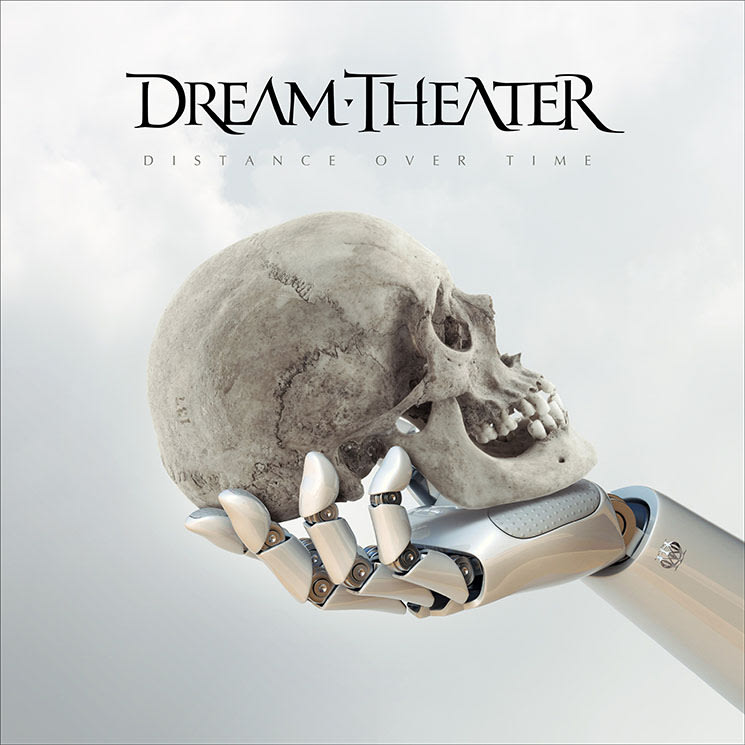It's hard to say where progressive metal would be today without Dream Theater. With other metal acts growing tired by the late '80s and early '90s, Dream Theater breathed new life into metal, popularizing a style of music that, on paper, had seemingly little to no commercial appeal. Their popularity, coupled by their early commercial success, sparked a wave of progressive metal bands, fortifying the genre as one of metal's most popular branches.
Almost 30 years later, Dream Theater remain relevant, consistently touring and releasing new material every couple of years without skipping a beat. Distance Over Time marks their 14th full-length release, and it might just be one of their best in recent memory.
Technically speaking, Dream Theater have never released a bad album. They can't. Guitarist John Petrucci is arguably one of the greatest guitarists alive today; the same could easily be said about John Myung's bass; drummer Mike Mangini holds a number of drum-related world records, in addition to having taught drums at Berklee; and keyboardist Jordan Rudess attended Juilliard at age 9.
Having said all of that, when one possesses such a technical understanding of music, it can become more of a science than art. While none of the albums released since 2010 have been bad per se, they've felt somewhat robotic.
Distance Over Time has a certain je ne sais quoi that has been lacking from the band's repertoire of late, a quality that is both emotionally stimulating and sonically engaging. In addition to this album's emotional appeal, it is decidedly their heaviest release since 2003's Train of Thought, an album that, up until now, has served as Dream Theater's metal barometer.
Tracks like "Untethered Angel," "Paralyzed" and "Fall Into the Light" go punch-for-punch with anything off of Train of Thought, but it is the album's conclusion, "Pale Blue Dot," that cements Distance Over Time as their heaviest record to date. "Pale Blue Dot" makes all of Train of Thought sound like a church hymn. One track single-handedly elevates the entirety of Distance Over Time, an otherwise good record, into a great one.
Dream Theater are by no means breaking any new ground on Distance Over Time. The album pulls from the same bag of tricks as the rest of their discography. What Distance Over Time does offer, however, is that "it" factor you can't quite put your finger on. Many lifelong fans claim the band lost their mojo the day founding member Mike Portnoy left the band. If that's the case, they seem to have found it on this release.
(Inside Out)Almost 30 years later, Dream Theater remain relevant, consistently touring and releasing new material every couple of years without skipping a beat. Distance Over Time marks their 14th full-length release, and it might just be one of their best in recent memory.
Technically speaking, Dream Theater have never released a bad album. They can't. Guitarist John Petrucci is arguably one of the greatest guitarists alive today; the same could easily be said about John Myung's bass; drummer Mike Mangini holds a number of drum-related world records, in addition to having taught drums at Berklee; and keyboardist Jordan Rudess attended Juilliard at age 9.
Having said all of that, when one possesses such a technical understanding of music, it can become more of a science than art. While none of the albums released since 2010 have been bad per se, they've felt somewhat robotic.
Distance Over Time has a certain je ne sais quoi that has been lacking from the band's repertoire of late, a quality that is both emotionally stimulating and sonically engaging. In addition to this album's emotional appeal, it is decidedly their heaviest release since 2003's Train of Thought, an album that, up until now, has served as Dream Theater's metal barometer.
Tracks like "Untethered Angel," "Paralyzed" and "Fall Into the Light" go punch-for-punch with anything off of Train of Thought, but it is the album's conclusion, "Pale Blue Dot," that cements Distance Over Time as their heaviest record to date. "Pale Blue Dot" makes all of Train of Thought sound like a church hymn. One track single-handedly elevates the entirety of Distance Over Time, an otherwise good record, into a great one.
Dream Theater are by no means breaking any new ground on Distance Over Time. The album pulls from the same bag of tricks as the rest of their discography. What Distance Over Time does offer, however, is that "it" factor you can't quite put your finger on. Many lifelong fans claim the band lost their mojo the day founding member Mike Portnoy left the band. If that's the case, they seem to have found it on this release.
